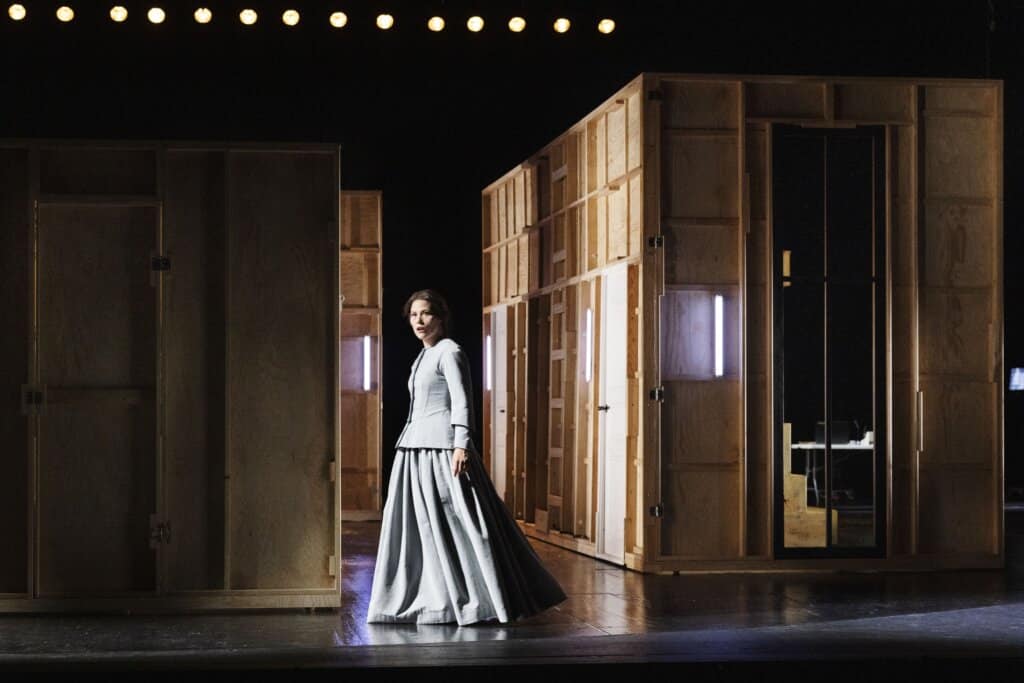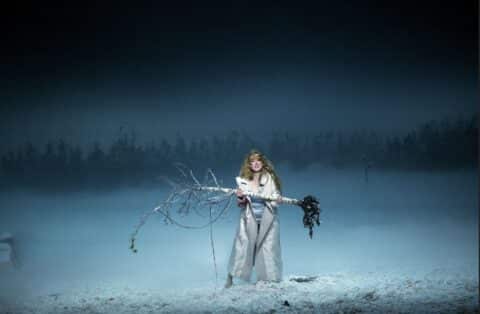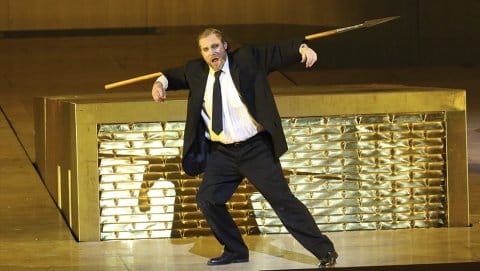SKRUEN STRAMMES • DET KGL. TEATER
★★★☆☆☆

Photo: Miklos Szabo
REVIEW TURN OF THE SCREW: MYSTICISM SPREADS MORE THAN GOOD IS
The mystery spreads more than is good in the Royal Danish Theatre’s production of Benjamin Britten’s chamber opera Turn of the Screw. Copenhagen Royal Opera Theaters’ production of Benjamin Britten’s chamber opera Turn Of The Screw, which, despite fine vocal performances and a dynamic set design, leaves an unresolved impression and a lot of question marks.
Britten’s ghost opera is equipped with a number of double layers in the narrative, which, despite its premiere on a well-rested Sunday afternoon, only made sense at times.
The play is adapted from a gothic horror novella by Henry James, which has been praised in several literary forums.
The dark plot is reminiscent of the Hollywood movie The Others starring Nicole Kidman, if that rings a bell.
Turn Of The Screw was commissioned by the Venice Biennale and premiered at La Fenice in 1954.
A leading cultural critic has recently voiced some criticism of performances that require an instruction manual to understand. Performing arts must work in real time. This one doesn’t.
I simply didn’t get much of the story, other than a sense of an underlying motif about the composer’s challenges with his homosexuality. Perhaps an association with Thomas Mann/Death in Venice – while we’re on that subject.
Then we’re back to the instruction manual again, when you need to be in a larger context to understand what’s really going on on the boards. My research has not been able to verify the homoeroticism, but according to several literary analysts, some form of sexual pulse seems to be implied.
Turn of the Screw is about a governess who has to look after two children at a country house that turns out to be haunted by the ghosts of former employees. The children, Miles and Flora, seem to be part of this double world that the new governess tries to shield them from.
Let’s be clear, Clara Cecilie Thomsen is excellent as the governess, regardless of the complicated circumstances.
Are the two innocent children really that innocent?
From the very beginning, there is something untold beneath the surface, a darkness behind the children’s beautiful, intelligent and caring exteriors. The perfection of the children is ominous in itself, with impressive performances from Milo Wajnman Køie as Miles and Barbro Citron as Flora.
There is a sneaking suspicion that the haunting, and the children’s possible connection to it, may only be a figment of the governess’s imagination. Is her protective instinct towards the children more likely to be possessive, initiated by sexual understimulation?
Did she invent it all herself, or what’s going on with her employer, the children’s uncle who must not be contacted under any circumstances and doesn’t want to get involved in the past, her son’s expulsion from school, missing letters, the boy chanting Latin lines about evil, Flora growing wings and Miles dropping dead?
Something points to a homosexual or even pedophile theme – forever trapped, lonely and shamed because of sexuality or abuse. It sounds like something that has the right zeitgeist to be staged today.
But I’m not sure, and I’ve subsequently come to understand that a dark, unresolved doubt is part of the point – and the horror – which never really takes hold in the somewhat postulated mockup set design with stagehands at work all around.
Britten’s musical universe is contemporary, i.e. modern classical and in itself challenging for many. Skruen Strammes does not seem to reach the qualities of Peter Grimes, which the Royal Danish Opera delivered in a brilliant Britten. delivered in a brilliant Britten performance last year.
The music revolves around a twelve-tone theme introduced just after the prologue, and the motif is used in variations to tie the 16 acts of the piece together. Dissonance abounds and singable sequences in the traditional operatic sense are few and far between.
Turn Of The Screw is performed as part of Opera Europe’s efforts to bring opera to a wider audience. This opera seems so narrow that it seems to achieve exactly the opposite.
Three stars from Got To See This.



![★★★★★☆ REVIEW IL TROVATORE: DEVILISHLY GOOD VERDI IN ZURICH iltrovatore_c_monikarittershaus_132[1]](https://detskuduse.dk/wp-content/uploads/2022/10/iltrovatore_c_monikarittershaus_1321-480x270.jpg)
